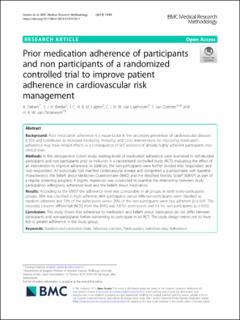Prior medication adherence of participants and non participants of a randomized controlled trial to improve patient adherence in cardiovascular risk management
Sieben, Angelien; Bredie, Sebastian JH; Luijten, JCHBM; van Laarhoven, Cornelius JHM; van Dulmen, Sandra; van Onzenoort, Hein A W
Peer reviewed, Journal article
Published version
Permanent lenke
https://hdl.handle.net/11250/2647163Utgivelsesdato
2019Metadata
Vis full innførselSamlinger
Sammendrag
Poor medication adherence is a major factor in the secondary prevention of cardiovascular diseases (CVD) and contributes to increased morbidity, mortality, and costs. Interventions for improving medication adherence may have limited effects as a consequence of self selection of already highly adherent participants into clinical trials. Methods: In this retrospective cohort study, existing levels of medication adherence were examined in self-decided participants and non-participants prior to inclusion in a randomized controlled study (RCT), evaluating the effect of an intervention to improve adherence. In addition, the non-participants were further divided into ‘responders’ and ‘non responders’. All individuals had manifest cardiovascular disease and completed a questionnaire with baseline characteristics, the Beliefs about Medicines Questionnaire (BMQ) and the Modified Morisky Scale® (MMS®) as part of a regular screening program. A logistic regression was conducted to examine the relationship between study participation willingness, adherence level and the beliefs about medication. Results: According to the MMS® the adherence level was comparable in all groups. In both (non)-participants groups, 36% was classified as high adherent; 46% participants versus 44% non-participants were classified as medium adherent and 19% of the participants versus 20% of the non-participants were low adherent (p = 0.91. The necessity concern differential (NCD) from the BMQ was 3.8 for participants and 3.4 for non-participants (p = 0.32). Conclusion: This study shows that adherence to medication and beliefs about medication do not differ between participants and non-participants before consenting to participate in an RCT. The study design seems not to have led to greater adherence in the study group.
Beskrivelse
This article is distributed under the terms of the Creative Commons Attribution 4.0 International License which permits unrestricted use, distribution, and reproduction in any medium, provided you give appropriate credit to the original author(s) and the source, provide a link to the Creative Commons license, and indicate if changes were made.

